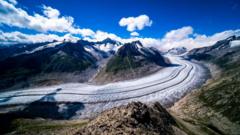Glaciers function as crucial freshwater sources for millions, yet their retreat poses severe risks not only to local water supplies but also contributes to rising sea levels. Specifically, mountain glaciers could raise global sea levels by 32cm (13 inches) if completely melted. According to Michael Zemp, director of the World Glacier Monitoring Service and lead author of the research, the ice loss in 2023 alone matches the water consumption of the entire global population over 30 years.
Evidence shows that glaciers have been shrinking for over two decades as temperatures rise from human-induced activities such as fossil fuel combustion. For example, Central Europe has experienced a staggering 39% loss of glacier ice within roughly 20 years. This consistent pattern across different regions reinforces the notion that glaciers are sensitive indicators of climate change.
The study's innovation lies in integrating varied research methods, enhancing the reliability of its findings. As the world's population continues to depend on seasonal meltwater, the consequences of glacial loss are profound, encompassing not just local ecosystems but also global climate patterns. The future trajectory of glacier melting will significantly depend on humanity's efforts to curb carbon emissions, with substantial losses predicted if current warming trends continue unchecked.
Furthermore, the increasing sea levels from glacial melt can lead to heightened coastal flooding risks, thereby endangering millions of people. As the situation intensifies, climate scientists urge immediate action to mitigate warming and protect these vital ice reserves. The findings serve as a call to action, stressing the value of collective efforts to preserve glacier health for both ecological balance and human survival.
In summary, the alarming rate at which the world’s glaciers are melting underscores urgent climate action needs to protect global water resources and manage climate impacts effectively.
Evidence shows that glaciers have been shrinking for over two decades as temperatures rise from human-induced activities such as fossil fuel combustion. For example, Central Europe has experienced a staggering 39% loss of glacier ice within roughly 20 years. This consistent pattern across different regions reinforces the notion that glaciers are sensitive indicators of climate change.
The study's innovation lies in integrating varied research methods, enhancing the reliability of its findings. As the world's population continues to depend on seasonal meltwater, the consequences of glacial loss are profound, encompassing not just local ecosystems but also global climate patterns. The future trajectory of glacier melting will significantly depend on humanity's efforts to curb carbon emissions, with substantial losses predicted if current warming trends continue unchecked.
Furthermore, the increasing sea levels from glacial melt can lead to heightened coastal flooding risks, thereby endangering millions of people. As the situation intensifies, climate scientists urge immediate action to mitigate warming and protect these vital ice reserves. The findings serve as a call to action, stressing the value of collective efforts to preserve glacier health for both ecological balance and human survival.
In summary, the alarming rate at which the world’s glaciers are melting underscores urgent climate action needs to protect global water resources and manage climate impacts effectively.





















